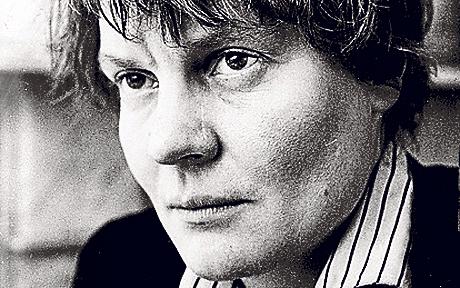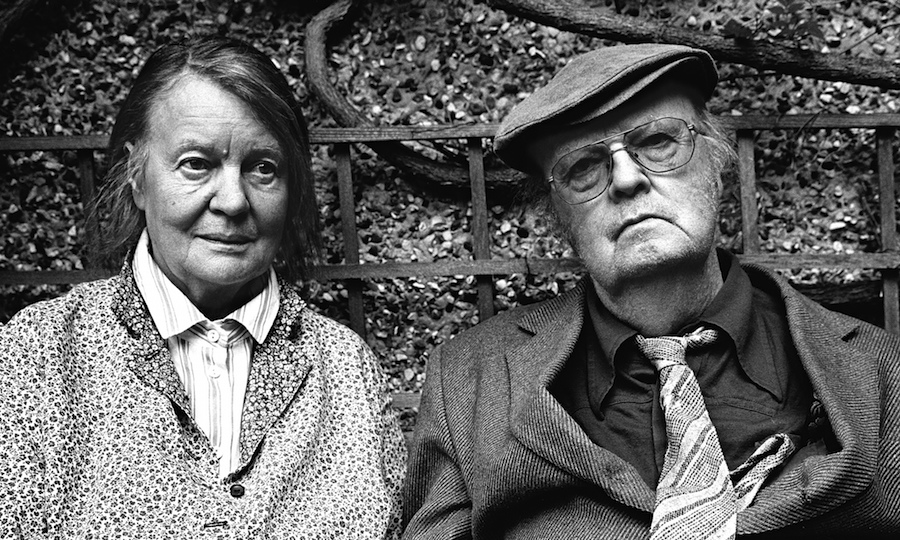As I Knew Her
A.N. Wilson
(Arrow Books)
Writing is like getting married.One should never commit oneselfuntil one is amazed at one's luck.
--- Iris MurdochThis is not so much a biography, as it is a mostly benevolent dissection of one friend by another, as only a close friend could do it: The organs carefully set aside --- spleen, liver, brain, eyes, heart and so on --- and tenderly examined. Wilson knew Murdoch --- IM in the book --- and her husband of more than four decades, John Bayley, for many years. Much younger than the couple, he was a student of Bayley's at Oxford. Wilson's relationship with Murdoch was solely a meeting of hearts and minds, not bodies, unlike her many other male and female friendships, which were often both.He lists her strengths, weaknesses and authentic exhibitions of brilliance. But it's no hagiography. He's sometimes blunt in calling her out where he feels her personal quirks undermined her work, or just dulled a dinner party conversation (her incessant asking of questions on often banal topics --- "What brand of vacuum cleaner do you use?" --- drove some acquaintances to the precipice of patience). Yet he also concedes that he knew her too well and closely to give us anything like an objective, straight-on portrait. Who wants that anyway? I prefer Picasso's approach --- an intimate view from multiple angles but seen all at once.
This affectionate, amplified, profoundly subjective rendering is illuminating, even for someone like me who's never read one of Murdoch's dozens of books, because, in addition to his deep grasp of the writer, her mind and motives, Wilson is a master of anecdote, digression and miniature, frequently amusing, character studies of the many peripheral personalities. And he's insightful and writes beautifully. Some have called the book mean or a betrayal of the couple. I don't see it, though Wilson's view can be a critical one. (In my own defense, actress Kate Winslet, who played the young Murdoch in the Alzheimer's extravaganza, "Iris," admitted she had not "had the time" to read any of Murdoch's work. I know I'm at least as busy as Ms. Winslet.)
In little more than 260 pages Wilson takes apart Murdoch for us, also deconstructing her peculiar marriage (what marriage isn't?) to Bayley, and Bayley himself. Wilson claims he was actually closer to Bayley, at least early on --- the two had a standing date for lunch each week, drank, went to movies, visited friends, all without Murdoch. But Wilson and Murdoch, who died in 1999, certainly had the deeper, more complex, more textured friendship over time.
Bayley and Murdoch could be childlike, and childish, he says --- they were abysmal housekeepers; their garden was an unkempt tangle of living and dead foliage; and their several elderly VWs were smelly, rolling wrecks. They refused to hire help, even as Murdoch's illness intensified. Money was not the problem; they had plenty of it, but they were cheap. (Murdoch left more than 2 million pounds in her will; over 3 million US dollars.)
While Wilson calls Bayley, who he refers to as JOB, "a dear friend and mentor and supporter of mine," at the end of the book he does a harsh take-down of him for the volumes Bayley wrote about Murdoch while she was in the black depths of Alzheimer's disease before her death, and after she passed away. Bayley (he died in January 2015) always insisted that the sometimes luridly, sexually, even scatologically, revealing tell-alls were what Murdoch would have wanted. Wilson doesn't agree.
"I had always thought of him as dear, sweet, bumbling, smiling JOB," Wilson writes, "who 'didn't mind a bit' when IM received all the plaudits, achieved international fame and acclaim as a writer of genius, took many lovers and had many friends, and then declined into being a demanding, incontinent old wreck. I changed my view and began to wonder whether, inside this uncomplaining little leprechaun, there was a screaming, hate-filled child who minded very much indeed . . . JOB's preservation of his version of IM's memory could now be viewed as a kind of revenge. He had now displaced his wife as the one in the partnership who was the writer . . . Poor man. He who 'hated kids', and who persuaded himself that IM had never wanted them, ended up with a companion who had come to resemble the category of being whom he most loathed."
What tweaks Wilson is that there was so much more to her life and work than what Bayley's last-word memoirs made famous, and like many others he takes a dim view of Bayley's remarriage the same year Murdoch died. Despite her talent and considerable success, "She was doomed to become the Alzheimer's Lady," he says, thanks in large part to Bayley's books about her, especially the first, Iris: A Memoir (1998), which was a bestseller and was made into the 2001 film "Iris" starring Kate Winslet and Judi Dench, with Bayley played by Jim Broadbent. Meanwhile, "Clumsy Oxford seeks to perpetuate her memory, not by a Chair of Literature or Philosophy but of Alzheimer's," Wilson says bitterly. "The great are now to be remembered by the diseases which killed them rather than by their gifts, as though the Tolkien Chair should be, not of Old English Philology, but of Bronchitis."
But the score settling with Bayley occurs in just the last few pages of the book; most of his references to his former professor are fond ones. The volume is largely focused on Murdoch and her work. It's often funny, other times not. Wilson describes her novels as
a coruscating analysis of the human capacity to turn love into power-games; the most uncompromising scrutiny of what takes place in the tyrant's cage which masquerades as a happy marriage. More than any English writer of her generation, she stared with wide-awake intensity into the muddied waters of our emotional lives, exposing our confusions, our need to deceive ourselves and other people.
Wilson acknowledges that Murdoch's reputation as a writer is not what it once was. "It will rise," he adds. She was prolific and her work covered vast territory. Between 1954 and 1997 she published 26 novels, five volumes of philosophy, five plays, a book of short stories and two of poetry. "She may be seen as a lesser writer than Dostoevsky or Proust," he says, "but she aspired to be in their league."
When Wilson and Murdoch met he was 19, she was 50. It was at one of the sherry parties Bayley often hosted for his pupils. They talked politics. She asked if he was right-wing or left-wing. He said he didn't know. She said she'd always sympathized with the left (she drifted to the right in later years). "Playing tapes of her voice to myself in the years since she died, I've come to the conclusion that a very large part of IM's hypnotic grace lay in this voice. It sounds like the voice of Wisdom itself: it is playful, but serious. It is musical and sad, but interrupted by laughter. It is in more than one sense a seductive voice." Later he writes, " . . . in her presence you felt that you were with a person who was not like other people." He describes her quality of depth as a "spiritual power."
It was a little like meeting a mage or a guru, and this feeling persisted even if the words proceeding from her mouth were, however beautifully articulated, commonplace or disputable.
Several times in this non-biography biography, Wilson pops up, questioning his own intent and even the conventional biographical form itself, much as Murdoch might have interrogated him over sherry or something stronger (she and Bayley were connoisseurs of cheap whiskey). One critic called Wilson's book " . . . a fine satire of the literary biographical form." Wilson: "Wasn't it all a bit too neat, the notion that you could 'explain' a human life by telling the story of it in chronological order . . . Did not a reading of the best fiction, psychology or, come to that, the modern philosophy of mind suggest the human personality was altogether more protean, complex and strange than the simple exercise of biography would usually suggest?"
It gets tedious when Wilson engages in a bit too much internal wrestling as to whether or not he should take the assignment of writing a Murdoch biography. His wife counsels him not to touch it with a "barge pole." Murdoch and Bayley think he's the ideal choice. He is still arguing with himself on page 45, but finally decides to forge on, though in his own unconventional way. Lucky for us. If he had decided against it we would not be treated to memories like this one about "Former Master, Alan Bullock:"
It was in this room that, during a pause in the conversation, he once remarked, "I hear copulating ducks." (Northern vowels --- dooks. Cup-you-lairtin dooks.)
"How," ventured someone, "do you know, Master, that the ducks are copulating?"
"Because that's the noise I make when I copulate." ("That's the noise that ah mairk wun ah cup-you-lairt.")
Silliness aside --- both Murdoch and Bayley rightly believed in its worth --- all three principals in this book, Wilson and his subjects, are heavyweights. As I Knew Her removes any doubt about that. Bayley, often by his own design, comes off as bumbling or elfin and can seem slightly goofy. It was an act. He was, still is, an acclaimed critic, a powerful intelligence, emotionally complex.
Perhaps he didn't have the chops of Murdoch in the fiction sphere, nonetheless he published five novels of his own. And his books of criticism on Keats, Pushkin, Shakespeare and others are widely praised. He told one friend that he thought he "went a little crazy" when he wrote the too-candid Murdoch memoirs. Given the life they had, and the force of nature that was their relationship for 43 years, that seems a reasonable, believable rationale.
He also said, "We were separated, but never separate." Wilson's book underscores that observation at the same time it pushes back on --- corrects with considerable richness, even elegance --- the skewed image of Murdoch Bayley's memoirs and the movie left in the public's mind.

